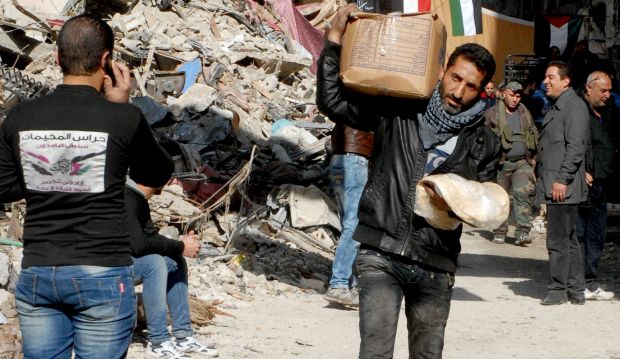
A handout file picture made available by the official Syrian Arab News Agency (SANA) on April 1, 2015 of Palestinians carrying food supplies in the Palestinian Yarmouk refugee camp, in Damascus, Syria, on January 30, 2014. (EPA/SANA Handout)
Beirut, Reuters—Islamic State of Iraq and Syria (ISIS) fighters seized most of a vast camp for Palestinian refugees on the outskirts of Damascus from other insurgents on Wednesday in a bid to capture a major foothold close to President Bashar Al-Assad’s seat of power.
In a separate advance, rebel groups that have received backing from Assad’s Arab and Western foes captured a border crossing with Jordan, the first time Damascus has lost it since the start of the conflict, sources on both sides said.
The gains by groups at opposite ends of the insurgent spectrum show the pressures still facing Assad, who has sought to shore up his control over western Syria including the border zone with Jordan and Israel—the last notable foothold of the mainstream rebels who have largely been eclipsed by jihadists.
They come just days after an alliance of Islamist groups captured the northwestern city of Idlib from the government. The Al-Nusra Front, Al-Qaeda’s wing in Syria and one of the groups involved, announced on Wednesday the city would be run according to Shari’a law.
The ultra-hardline ISIS already controls swathes of eastern Syria and Iraq and is being targeted by a US-led campaign of airstrikes.
Until Wednesday’s assault on the Yarmouk refugee camp, the group did not have a major presence in the area around the capital, where insurgents have mainly been loyal to other groups.
The Yarmouk refugee camp, which was home to half a million Palestinians before the conflict began in 2011, has been held by anti-Assad insurgents and besieged by government troops since the early days of the war. It is a few kilometers from the heart of Damascus, which is still firmly in government control.
Mirroring the way ISIS has grown elsewhere in Syria, its fighters seized control of areas of the camp from other insurgents, helped by rebels from the rival Al-Qaeda-linked Al-Nusra Front who switched sides, a political activist in the area said.
“They pushed from the Hajar Aswad area and Nusra fighters have joined them, they have pledged loyalty to Daesh (ISIS),” the activist said, speaking via Skype.
Anwar Abdel Hadi, the Palestine Liberation Organisation representative in Damascus, said: “[Islamic State] went into Yarmouk today. There are clashes between the militants at the moment.”
The United Nations said it was extremely concerned about the safety and protection of Syrian and Palestinian civilians there. It estimates the population of Yarmouk at about 18,000, with most of its residents having long since fled.
Government officials could not be reached for comment.
Hassan Hassan, an analyst and author of a book about ISIS, said the group had long wanted a foothold close to the capital but that it was unlikely to be able to storm the center.
“The regime has established strong checkpoints and infrastructure to prevent forces from actually getting inside Damascus. But they are edging closer.”
An alliance of mainstream rebel groups known as The Southern Front said it had captured the Nasib crossing at the border with Jordan. A staunch US ally, Jordan had previously used its influence over the rebels to stop them from taking the crossing, fearing it could risk a military response from Damascus.
A security source on the government’s side confirmed the crossing had fallen, saying the army had withdrawn.
“It has been liberated,” said Bashar Al-Zoubi, leader of the Yarmouk Army, one of the rebel groups in southern Syria that was involved in the offensive. “The crossing is with us,” he added, in a message sent to Reuters via Internet.
The southern rebel groups have launched a counter offensive against a recent bid by Damascus and allied militia to reclaim the south, an area of vital strategic importance for reasons including its proximity to Israel.
The rebels say states that want to see Assad gone from power responded to the offensive by sending them more weapons.
The Al-Nusra Front, which has a presence in the south, joined the attack on the crossing after the rebels had already launched it, according to the Syrian Observatory for Human Rights. The rebels said they had expelled Al-Nusra from the area.
Al-Nusra Front shares ISIS’s jihadist ideology but does not recognize its rival’s declaration last year of its leader Abu Bakr Al-Baghdadi as “caliph”, or ruler of all Muslims.
On Thursday Al-Nusra Front declared that Idlib, which was seized from government forces on Saturday by a coalition of militant groups, would now be ruled according to Shari’a law.
“We salute the people of Idlib and their stand with their sons, the Mujahideen . . . and God willing they will enjoy the justice of Shari’a, which will preserve their religion and their blood,” Nusra Front leader Mohammad Al-Golani said in an audio recording posted online.
Idlib, around 20 miles (30 kilometers) from the Turkish border is only the second provincial capital to slip from government hands after Raqqa in the east, which ISIS has turned into its de facto capital.
The groups that seized Idlib have rejected a call by the internationally recognized Turkey-based opposition to headquarter an interim government there. The Observatory said insurgents were destroying cigarettes and tobacco, which many Islamists view as banned in Islam.
The news agency of the Vatican’s missionary department reported on its website that a Greek Orthodox priest had been kidnapped by “jihadist militias” in the city.
Golani said Idlib residents would be treated well and public property would be protected. He urged employees of essential facilities including bakeries to go back to work and said an Islamic court should be set up to settle disputes.
Al-Nusra Front’s influence has been expanding in northwestern Syria. It has crushed at least two Western-backed rebel groups in recent months and seized weapons including US-made anti-tank weapons from them.
